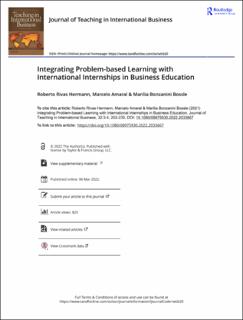| dc.contributor.author | Hermann, Roberto Rivas | |
| dc.contributor.author | Amaral, Marcelo | |
| dc.contributor.author | Bonzanini Bossle, Marilia | |
| dc.date.accessioned | 2022-08-11T10:39:14Z | |
| dc.date.available | 2022-08-11T10:39:14Z | |
| dc.date.created | 2022-03-07T09:43:44Z | |
| dc.date.issued | 2021 | |
| dc.identifier.citation | Hermann, R. R., Amaral, M. & Bossle, M. B. (2021). Integrating problem-based learning with international internships in business education. Journal of Teaching in International Business, 32(3-4), 202-235. doi: | en_US |
| dc.identifier.issn | 1528-6991 | |
| dc.identifier.uri | https://hdl.handle.net/11250/3011255 | |
| dc.description.abstract | The literature on international business teaching has contributed to the development of international internships as a learning pedagogy through three key areas: making sense of the students’ developed competences and prospective added employment value following their participation in international internships, the role of support structures in the organization of internships abroad, and more recently the pedagogical design of internships abroad. Thus, more recent research has taken a critical stance toward internships as a learning form, as serious gaps exist in the pedagogical elements required to connect internships with the broader theoretical elements of international business programs. The present study addresses these gaps through two research questions: i) How can educators design and implement problem-based international internships in business education? ii) What adjustments does the combination of these two active learning experiences in business education demand for small business schools, partner universities, and hosting organizations? The paper presents pedagogical action research that was conducted over two courses for international business internships in a Norwegian-Brazilian context for bachelor’s and master’s students. It contributes to the international business teaching literature in the following ways: First, the validated teaching framework argues for international internships that are linked to loosely defined problems at the host organization, which the student self-scopes and connects based on their theoretical knowledge from other courses. Second, by providing an in-depth discussion of problem-based learning and its applicability in international business practicums, we address the existing gap in the field regarding the pedagogical foundations of how students connect theory to practice during international internships. Third, the framework serves as a practical guideline for teaching and administrative staff who wish to develop international internship programs at home universities, supporting their ability to connect the practical aspects established in the literature with the additional organizational requirements arising from working with hosting organizations overseas. | en_US |
| dc.language.iso | eng | en_US |
| dc.publisher | Routledge | en_US |
| dc.rights | Attribution-NonCommercial-NoDerivatives 4.0 Internasjonal | * |
| dc.rights.uri | http://creativecommons.org/licenses/by-nc-nd/4.0/deed.no | * |
| dc.title | Integrating problem-based learning with international internships in business education | en_US |
| dc.type | Peer reviewed | en_US |
| dc.type | Journal article | en_US |
| dc.description.version | publishedVersion | en_US |
| dc.rights.holder | © 2022 The Author(s) | en_US |
| dc.subject.nsi | VDP::Samfunnsvitenskap: 200::Pedagogiske fag: 280 | en_US |
| dc.source.pagenumber | 202-235 | en_US |
| dc.source.volume | 32 | en_US |
| dc.source.journal | Journal of Teaching in International Business | en_US |
| dc.source.issue | 3-4 | en_US |
| dc.identifier.doi | 10.1080/08975930.2022.2033667 | |
| dc.identifier.cristin | 2007928 | |
| dc.relation.project | Direktoratet for internasjonalisering og kvalitetsutvikling i høgare utdanning: INA-2018-10058 | en_US |

